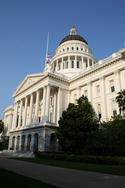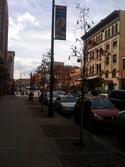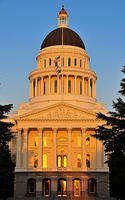Arizona's recent passage of what is widely perceived as a harsh anti-immigrant bill reflects a growing tendency--in both political parties--to focus on the here and now, as opposed to the future. The effort to largely target Latino illegal aliens during a sharp recession may well gain votes among an angry, alienated majority population, but it could have unforeseen negative consequences over time. read more »
California
California is Too Big To Fail; Therefore, It Will Fail
Back in December I wrote a piece where I stated that California was likely to default on its obligations. Let’s say the state’s leaders were less than pleased. California Treasurer Bill Lockyer’s office asserted that I knew “nothing about California bonds, or the risk the State will default on its payments.” My assessment, they asserted, “is nothing more than irresponsible fear-mongering with no basis in reality, only roots in ignorance. Since it issued its first bond, California has never, not once, defaulted on a bond payment.” read more »
Finding the Good in This Bad Time
This year's best places rankings held few great surprises. In a nation that shed nearly 6.7 million jobs since 2007, the winners were places that maintained or had limited employment declines. These places typically had high levels of government spending (including major military installation or large blocs of federal jobs) or major educational institutions. Nor was the continued importance of the energy economy surprising in a nation where a gallon of gas is still about $3 a gallon. read more »
- Login to post comments
The War For Jobs, Part II: Teamwork On The Frontlines
So if we are in a new war -- this one for business and job growth -- what role does local government play?
It would be a mistake to over-emphasize the role of government, especially at the local level. Despite the claims of politicians from both parties about how many jobs their policies "created," governments don't create jobs, at least not in the private sector. Ventura, for example, is estimated to generate about seven to eight billion dollars in annual economic activity. The sales and profitability of thousands of individual businesses are only marginally impacted by what goes on at City Hall, no matter what cheerleaders or critics might claim. read more »
- Login to post comments
The War For Jobs Trumps The War For Sales Tax Dollars: Part I
At the beginning of every war, generals always try to fight the last one. Experienced professionals are often the last to realize the times and terrain have changed.
Since the passage of Proposition 13 — the 1978 'taxpayer revolt' against California property taxes — most California cities have focused on generating sales tax. Property tax, which had been the traditional backbone of local revenue, was slashed by 60%, sparking an intense Darwinian struggle between cities for sales tax market share. During the nineties, the cities along the 101 Corridor in Ventura County competed intensely in the “mall wars” over which cities would get auto dealers and major retailers. The City of Ventura read more »
Denver Relocation: The Search for Higher Ground
In 2003 our family relocated to Folsom, California from Carson City, Nevada, after my father-in-law was diagnosed with Parkinson’s disease, to help with his care. In many ways the transition felt like an immersion into what Joel Kotkin calls the “city of aspiration.” Folsom, a Sacramento region suburb of 50,000, was notable for its robust economy, impressive K-12 schools, world-class bike paths, and low crime. It offered a favorable environment for families and upwardly mobile professionals.
Seven years later, the landscape has certainly changed. My father-in-law has passed on, and California's high cost of living continues to have a profound impact on our personal finances. This scenario, coupled with the currently dire economic picture, gave my wife and I pause to again rethink our future path. After many long nights of thoughtful dialogue, we came to the realization that it was time to break ties with the Golden State. In early summer, Denver will become our next home.
This pending relocation offers our family an opportunity to embrace what I call “the geography of place”— the merging of what one wants to do with where read more »
The Great Deconstruction - First in a New Series
History imparts labels on moments of great significance; The Civil War, The Great Depression, World War II. We are entering such an epoch. The coming transformation of America and the world may be known as The Great Deconstruction. Credit restrictions will force spending cuts and a re-prioritization of interests. Our world will be dramatically changed. There will be winners and losers. This series will explore the winners and losers of The Great Deconstruction.
***
The phrase, The Great Depression, was coined by British economist Lionel Robbins in a 1934 book of the same name. read more »
Another Caution on California: Golden State’s Grassroots Are Dying
The subject line on the recent e-mail got my attention: “The Speaker wants to talk with you.”
The message referred to California State Assembly Speaker John Perez, a Democrat who represents the 46th District, which includes Downtown and nearby districts that are part of the Garment & Citizen’s circulation area.
Perez has been in the Assembly for more than two years, and he’s gotten plenty of publicity for being the first openly gay person to become Speaker. Some folks are vaguely aware that he’s a cousin to Los Angeles Mayor Antonio Villaraigosa, and a former city commissioner. read more »
- Login to post comments
Forced March To The Cities
California is in trouble: Unemployment is over 13%, the state is broke and hundreds of thousands of people, many of them middle-class families, are streaming for the exits. But to some politicians, like Sen. Alan Lowenthal, the real challenge for California "progressives" is not to fix the economy but to reengineer the way people live. read more »
Deconstruction: The Fate of America? - The Changing Landscape of America
America is at a crossroads. Its current path is unsustainable. The deficit for fiscal year ending Sept. 30, 2009 was $1.42 trillion. The National Debt is $12.5 trillion with the debt ceiling just raised to $14.9 trillion. The National Debt has increased $4 billion per day since September 28, 2007. The Obama Administration projects trillion dollar deficits for years to come. It has bailed out GM and Chysler, the banks “too big to fail” , and state governments that cannot manage their budgets. read more »






















